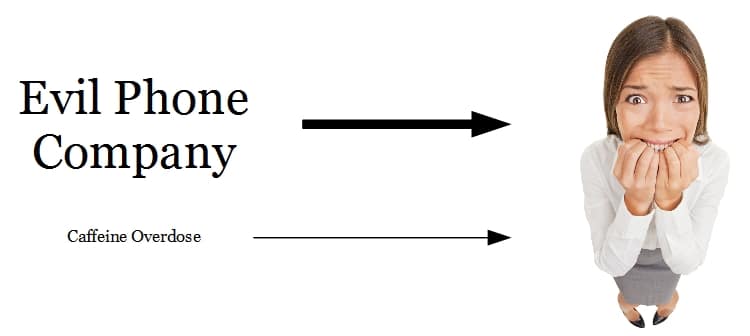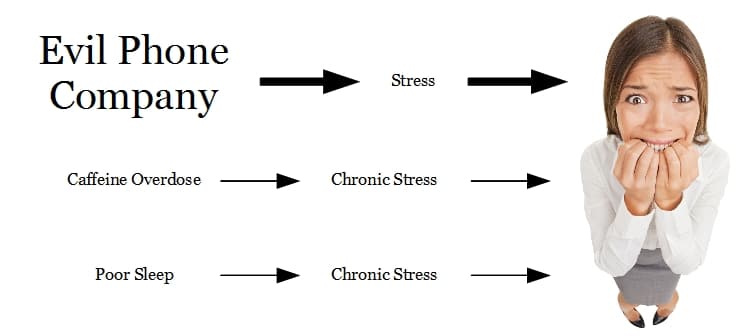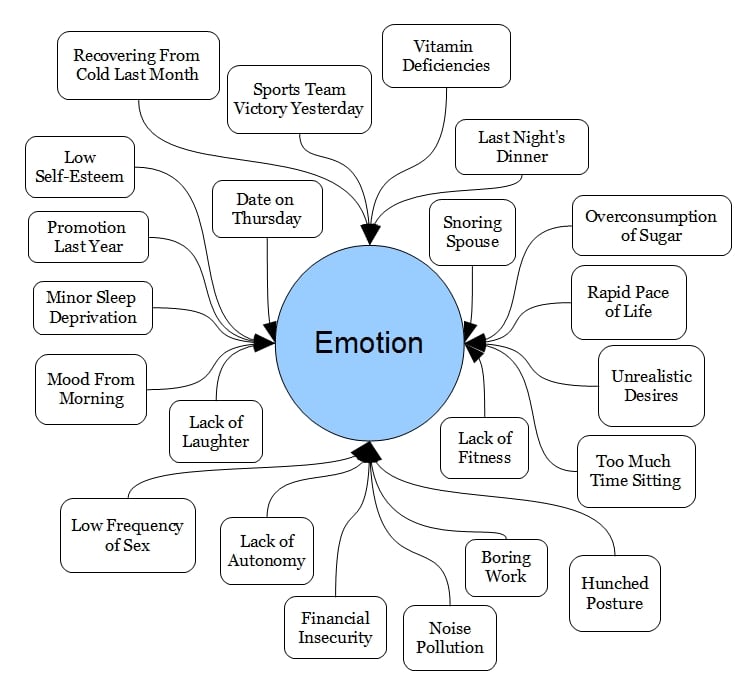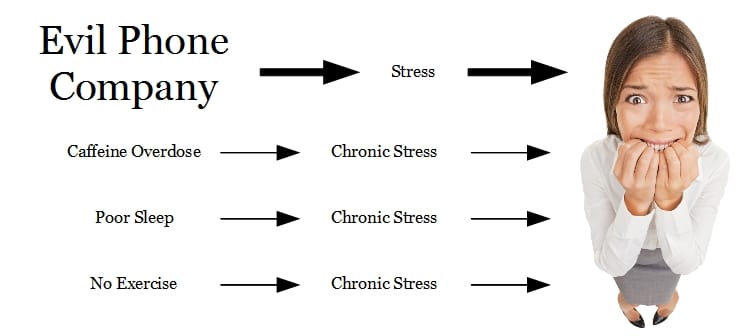When I was 16, I had the craziest summer of my life.
I woke up in the middle of the night, my heart pounding and my palms sweating.
Why oh why? Why had she broken up with me? I want her back!
Walking, talking, working, studying – whatever I was doing, she would pop back into my head. I called, texted, and banged on her door. She told me she never wanted to see me again.
I felt rejected. Woe was me.
Drugs make the heart go crazy.
At the start of my 16th summer, I was prescribed 2mg of prednisone, a type of steroid. Steroids aren't prescribed for fibromyalgia, but at that point, I was willing to try anything.
2mg is such a small dose that my doctor figured he didn’t need to warn me about side effects.
Oops.
I thought I was experiencing heart-pounding anxiety because I was in love. In fact, I was in love because I had been taking steroids.
Or rather – I thought I was in love because I was experiencing heart-pounding anxiety, which in turn was a side effect of my medication. So if you want someone to fall in love with you, give them steroids!
I was okay with the breakup when it happened – I liked her, but not that much. Waking up with a pounding heart? I hadn’t even experienced that for my first love. It was days after the breakup after I had increased my dosage, that I suddenly experienced a burst of emotion.
And I’d become aggressive, acting in ways I'd never before. Sadness would make sense – I'd been dumped. But anxiety lasting for hours every day for weeks? Aggression? Wrong emotions, wrong intensities, wrong durations.
Misattribution of Arousal
In 1974, psychologists Art Aron and Donald Dutton hired an attractive woman to stand in the middle of two bridges – one wide and sturdy, the other narrow, wobbly, and creaky.
Any men who passed her on their way across were asked to fill out a questionnaire and contribute to science. Many said yes. After they finished, the attractive women gave them her phone number and told them she'd be happy to discuss the study further if they wanted to call her that night. 50% of the men who talked to her on the wobbly bridge called, while only 12% of those who met her on the sturdy bridge did.
You may have heard of this before – it's called the suspension bridge effect. The men who talked to the women on the wobbly, suspension bridge were four times more likely to feel attracted to and therefore call the women. It is an example of suggestibility psychology.
There were problems with this study, but replications have shown significant effects. Doing exciting things with your significant other is effective at rekindling the flames of passion.
There were many problems with this study – the sample size was tiny, the study was not blinded, their math was funny, there were selection effects and more. Indeed, many of the specific claims made by the authors of that study have now been disproven. What is true is that in explaining our emotions, we simplify – where there might be 5 reasons for us to be sad, we focus on only the most obvious, ignoring the rest.
An Example of Misattribution of Arousal
A passage from Todd Kashdan's book is curious.
“In the comfort and safety of our romantic partner, the anxiety and tension we experience in new and risky situations often make us feel alive and excited. It triggers the feelings we had during our very first dates when we had no idea what the future holds and if everything would turn out okay. The highly desirable state of expanding and being fully alive is kindled afresh and becomes linked to our partner and the relationship.
This entire process of connecting positive experiences to our partner and the relationship happens outside of our conscious awareness. That is, we often have no idea why we feel a surge of loving feelings toward our partner after doing something interesting together.
To further test the idea of misattribution of arousal, researchers assigned relationship-enhancing exercises to 53 married couples. Any change would be profound because couples had been together for an average of 15 years! First, the participants looked through a long list of activities, rating them for how pleasant or exciting they would be to do as a couple. What someone rates as exciting is not always pleasant because when you try something new (out of your comfort zone), often you feel unwanted anxiety and are afraid of looking foolish or failing. Activities typically rated as very exciting were dancing, going to concerts, meeting new people, and thrill-seeking sports such as jet skiing; activities typically rated as very pleasant (but not exciting) were visiting friends, seeing a movie, and eating out.
Couples were randomly assigned to spend 1.5 hours each week for the next 10 weeks taking part in “exciting” or “pleasant” activities based on their own ratings. It was important for couples to choose from their own list because what’s exciting to you might be dreary and dull to me. Other couples were in the “no-intervention” group and told to do what they normally do for 10 weeks.
What these scientists found is that simply spending time together is not enough to enhance the quality of a relationship and that doing exciting things together is more valuable than doing pleasant and relaxing things together. Couples doing more exciting activities experienced a greater increase in marital satisfaction over the 10 weeks compared with couples who injected more pleasant events into their lives or those who stuck with their usual routines. The findings are profound because after only 10 weeks, couples viewed their 10-, 20-, and even 30-year relationships differently, and when excitement was added to the mix, they found them to be more satisfying. Misattribution of arousal in effect!
To determine exactly why taking part in exciting activities was linked to greater relationship satisfaction, researchers asked 112 couples who had been together for an average of 6 years to answer questions about their relationships such as “How bored are you in your relationship?” and “How exciting are the things you do in your relationship? “Couples doing a greater number of exciting activities viewed their relationship as more satisfying. Their exciting activities disrupted the day-to-day monotony that can creep into any relationship.
As a rigorous test of whether novel and exciting activities can demolish relationship boredom, we can look at what happened when the research couples were sequestered in a laboratory to study the role of these new activities. With this approach, researchers controlled the situation to make sure that all the couples engaged in the same novel, exciting activity (to rule out the idea that some couples just do cooler things).
One series of studies involved dozens of couples who were together for at least one year. Some couples took part in a seven-minute novel, shared the task. With their wrists and ankles tied together, they were instructed to drag their tangled web of limbs from one side of a soft, foamy room to the other side. A huge pyramid of rolled yoga mats was piled across the middle of the room, and their only option was to climb over it. As if this wasn’t hard enough, without using their hands, they had to carry a foam cylinder with them to the other side of the room.
At the end of the task, couples said it was extremely bizarre. Of course, you would be leading a pretty unusual life if you claimed otherwise. The other group of couples spent seven minutes taking turns crawling to the pyramid of mats and returning, back and forth, until time ran out. They did the task together as a couple but without the added excitement of being tied together, having to climb over the pyramid or carry the cylinder. Basically, they took turns crawling on a mat (how exciting!).
While we might expect couples doing the novel task to feel better in the moment, an interesting thing happened. They didn’t just feel good. They actually viewed their relationship differently than couples doing the mundane task. Couples viewed their long-standing relationships as more satisfying after a mere seven minutes of doing a unique activity together. The shared positive feelings carried over to how the partners viewed their entire relationship, seeing it as more rewarding, satisfying, and meaningful.
No such relationship improvements were found for those doing the dull activity together. In fact, many of the couples viewed their relationship as less satisfying after the dull activity. That’s important. If you fail to fill your free time with interesting activities, boredom and dullness spill over into how you judge your partner and relationship.”
You can purchase the book here.

Walking on that wobbly bridge, the men started feeling excitement and anxiety.
Whenever we experience an emotion, we want to know why. Those men wanted to know, “Why am I experiencing excitement and anxiety?”
The correct answer would be, “I'm walking on a bridge which seems dangerous. I know it's safe… but it seems like I could fall and die.”
But in explaining our emotions, our instinct is to seek out the most obvious answer. For those men, that obvious answer was, “I'm attracted to that women. Anxiety because I'm afraid of falling? Please, I'm no wuss.”
When I was experiencing heart-pounding anxiety, the obvious answer was, “I'm crazy in love with that women.”
But that answer was wrong. The correct answer was, “my hormones have become unbalanced because of my medication.”
Although you're not going to be crossing a wobbly bridge or be popping steroids anytime soon, misattribution of arousal is still relevant to your life.
An entire school of psychologists believe that the modern explosion of depression is caused in part by misattribution and suggestibility psychology.
Shit Hits The Fan – A practical time traveling misattribution example
It's Tuesday afternoon and you've just come home from work. You sit down and start opening your mail. See a bill from your phone provider. Nothing would please you as much as tossing it aside for later, but you know it's better to get it over with as soon as possible.

So you open it up and see a bill for $768. $50 for your monthly service, and then $718 in overages. Knowing the charges are a mistake, you curse out loud and throw the bill on th ground. And then you brew some tea to keep you company through the upcoming fight.
You expect an hour on the phone should resolve the problem. But the customer service rep, her manager, and then the manager's manager all insist that the charges are valid. That their records show that you had a four-hour international call last week.
Maybe both you and your grandma in Canada forgot to hang up… but that was a mistake.
Doesn't matter to them. If you refuse to pay they'll cut off your service, charge an additional $213 for premature cancellation, blackmark your credit, and send the bill to a debt collector.
You're stressed, angry and anxious. On a scale of 1 to 10, where 1 is zen-calm and 10 is I-want-to-kill-someone, you're 8.
Your internal narrative runs like this, “I'm experiencing stress, anger, and anxiety because my phone company is being unreasonable.”

But as reasonable as it seems, that narrative is harmfully simplistic.
Misattribution example – Take 2
You decide to send a letter to yourself one week in the past. Let's rewind the clock and see how that letter changes things around.
You receive a letter, written in your own handwriting, which says that you should mortgage your house, sell all your belongings, and invest as much money as you can into Ubic Inc or you'll have a psychotic break. You assume it's a prank – after all, you don't remember ever writing that letter, but you decide to listen just in case.
One week later Ubic has octupled in value, you're rich, and that expensive phone bill no longer seems like a big deal.
Moral of the story: invent the time machine.

But that moral is not so easy to follow, so let's try something more practical.
This time the letter says that you shouldn't drink more than one cup of coffee a day anytime during the next week. Lent is coming up, so you decide this could be a useful trial run.
During the first few days it's tough. You experience mild withdrawal.
Finally, the day that you receive that evil bill arrives.
Like before, you call your phone company, argue unsuccessfully, and end up feeling stressed, angry, and anxious. But not as much.
Instead of 8 out of 10 on the I-want-to-kill-someone scale, you feel like a 7. Which still sucks. But that's one point better than before.
For most, small amounts of caffeine consumed daily increases well-being; large amounts consumed daily causes tolerance and increases stress and anxiety.
This means that most of the stress and anxiety you felt was the fault of your phone company being ridiculous, but some of it was caused by unhealthy levels of caffeine in your body.
Your internal narrative, “I'm angry because my phone company is evil,” was too simplistic.

I used to get anxiety thinking about the quality of my writing, my taxes, and many other things. But after I reduced my caffeine intake to less than 60mg a day, I started experiencing less anxiety.
It took a while for it to get through to my brain, “yes, I'm anxious about my upcoming date because women are scary, but some of that anxiety is because of the caffeine I'm overdosing on!”
People rarely think, “do I have too much caffeine in my system?” when they experience anxiety. Misattribution.
Misattribution example – Take 3
Let's send another letter and rewind the clock one more time, but this time to two weeks before you receive that bill.
You receive a package in the mail which contains amber colored goggles and a letter.
The letter says four things:
You like your toes, so you follow those instructions.
During the first few days, it's tough to fight your coffee craving, get over your embarrassment at wearing strange goggles, and to sleep before midnight. But you do.
Finally the day that you receive that evil bill arrives.
Like before, you call your phone company, argue unsuccessfully, and end up feeling stressed, angry, and anxious. But not as much.
Instead of 8 out of 10 on the I-want-to-kill-someone scale, you feel like a 6. Which still sucks. But that's two points better than before.
Good sleep equals good mood. Bad sleep equals chronic low-level stress, reduced athletic performance, increased susceptibility to illness, and weight gain.
This means that most of the stress and anxiety you felt was the fault of your phone company being ridiculous, but some of it was caused by unhealthy levels of caffeine in your body and some of it was caused by the poor sleep you were getting.
Your internal narrative, “I'm angry because my phone company is evil,” was too simplistic.

After I started wearing blue-blockers, my well-being increased by 7%. I doubt you'll see as large an increase – after all I've got hypersomnia.
Check out this randomized study which shows that wearing blue-blockers improve mood.
People rarely think, “am I getting bad sleep?” when they experience anxiety. Misattribution.
Misattribution example – Take 4
Let's rewind the clock one last time, but now to two months into the past.
This time you receive the same package and message as before, but also a pair of running shoes and a message that if you don't jog for 20 minutes each week for the next eight weeks, you'll lose all of your hair and grow a unicorn horn.
For a second you consider ignoring the message – who wouldn't want to grow a unicorn horn? But you don't want to lose your hair, so you follow the instructions in the message.
The day that you receive that evil bill arrives.
Like before, you call your phone company, argue unsuccessfully, and end up feeling stressed, angry, and anxious. But not as much.
Instead of 8 out of 10 on the I-want-to-kill-someone scale, you feel like a 5. Three points better than before!
People are not designed to spend so few calories. The usual view is that exercising reduces stress. I suggest an alternative perspective – being sedentary causes low-level chronic stress.
This means that while most of the stress and anxiety was the fault of the ridiculous phone company, some of it was due to the presence of high levels of caffeine in your body, some of it was because you were getting poor sleep, and some of it was because you were so sedentary.
On my list of 54 Ways to Increase Your Happiness Set Point, exercise is #1, and for good reason.
Don't trust your internal narrator – he's a simpleton.
We could continue going back in time and making adjustments. I'm confident that a 50% reduction in anxiety and stress would be achievable.
When we experience an emotion, our internal narrator seeks out the most simple explanation. But the true picture is much more complicated.

We ignore the complications – the poor sleep, the lack of exercise, the unhealthy diet, the poor posture, the long commute, the drugs in our system.
There are dozens of factors acting behind the scenes which influence our emotions.
That theory of depression I mentioned?
It's that there are dozens of small things going wrong in our lives all the time.
Each of them alone is so subtle that we don't usually notice or care. We often ignore a bit of stress. But a little bit of chronic stress plus a little bit of chronic stress plus a little bit of chronic stress plus a little bit of chronic stress? That equals depression.
You may not be depressed, but you may still be experiencing enough low-level chronic stress that your negative emotions are being amplified.
“I'm anxious because I'm unhealthy” isn't an idea that occurs to our reptile brain. Caffeine, not exercising, and 50-minute commutes are all modern phenomena. That means that we can't rely on our internal narrator to tell us the true story.
The next time you're feeling sad or anxious or angry, consider that there might be more going on under the surface.




Wow, this is really making me take a second look at this “bad week” I had and wondering why it might have felt so “bad”.
I totally stopped going to the gym two weeks ago, got less sleep than usual, and I drink entirely more caffeine than I’d like to admit.
Way to call me out bro.